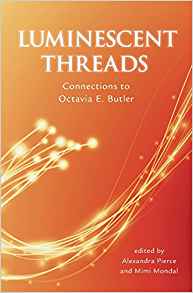Gary K. Wolfe reviews Lavie Tidhar
 A bin Laden figure shows up in Lavie Tidhar’s Osama, whose title alone would seem to suggest one of those occasional SF works whose timing unfortunately almost situates them in the backwash of actual events, like Norman Spinrad’s excellent Russian Spring appearing on the eve of the dissolution of the Soviet Union or the film The China Syndrome hitting theaters barely a week before Three Mile Island. In fact, though, Tidhar’s narrative strategy is such that Bin Laden’s actual death could almost seamlessly slide into this odd but oddly compelling venture into alternate history, which shares some characteristics with novels as diverse as Paul Park’s Princess of Roumania series, Spinrad’s The Iron Dream, and Kathleen Ann Goonan’s This Shared Dream (reviewed here last month), and which is notably more ambitious than Tidhar’s own quite enjoyable venture into steampunk with his recent Bookman novels. As in those novels, though, Tidhar enjoys playing with a variety of literary tropes and voices, the most notable of which is the Raymond Chandler tradition of hardboiled wisecrackery and weltschmerz (at one point the protagonist even thinks, ‘‘Down these streets a man must go’’), though, with occasional nods to pop culture icons as diverse as Janis Joplin or Kris Kristofferson (at another point he muses that freedom ‘‘was what you had when you had nothing left to lose’’) or the movie Casablanca (Dooley Wilson’s ‘‘As Time Goes By’’ runs like a background theme throughout the novel).
A bin Laden figure shows up in Lavie Tidhar’s Osama, whose title alone would seem to suggest one of those occasional SF works whose timing unfortunately almost situates them in the backwash of actual events, like Norman Spinrad’s excellent Russian Spring appearing on the eve of the dissolution of the Soviet Union or the film The China Syndrome hitting theaters barely a week before Three Mile Island. In fact, though, Tidhar’s narrative strategy is such that Bin Laden’s actual death could almost seamlessly slide into this odd but oddly compelling venture into alternate history, which shares some characteristics with novels as diverse as Paul Park’s Princess of Roumania series, Spinrad’s The Iron Dream, and Kathleen Ann Goonan’s This Shared Dream (reviewed here last month), and which is notably more ambitious than Tidhar’s own quite enjoyable venture into steampunk with his recent Bookman novels. As in those novels, though, Tidhar enjoys playing with a variety of literary tropes and voices, the most notable of which is the Raymond Chandler tradition of hardboiled wisecrackery and weltschmerz (at one point the protagonist even thinks, ‘‘Down these streets a man must go’’), though, with occasional nods to pop culture icons as diverse as Janis Joplin or Kris Kristofferson (at another point he muses that freedom ‘‘was what you had when you had nothing left to lose’’) or the movie Casablanca (Dooley Wilson’s ‘‘As Time Goes By’’ runs like a background theme throughout the novel).
Although the novel opens with a prologue describing in journalistic terms the 1998 bombing of the US Embassy in Nairobi, we quickly learn that this is a clever misdirection. The action proper begins in Vientiane, Laos, where a down-at-the-heels private eye named Joe is approached by an equally archetypal mystery woman, who offers him an apparently unlimited expense account to track down a pulp author with the unlikely name of Mike Longshott, whose popular series of adventure novels Osama Bin Laden: Vigilante depict a terrorist-ridden world which we quickly recognize as our own – and the interspersed passages from these novels, like the prologue, are straightforward journalistic accounts of actual terrorist events, including Richard Reid’s goofy onboard attempt to ignite his shoe and the 2005 London bombings. (One of Longshott’s novels is World Trade Center, a phrase that means nothing to Joe but everything to us, and Tidhar wisely doesn’t go too far down that path.) Gradually, we are given clues about the history of Joe’s own world, where de Gaulle was killed in 1944 and the author Saint-Exupery was a president of France – and where, most importantly, international terrorism has never really gained a foothold. As Joe sets out on his international investigation, first to Paris to track down the sleazy porn house where the novels are published, later to London, New York (where he even attends a Mike Longshott fan convention, rendered as an affectionate parody of small-time cons), and Afghanistan, he learns that powerful forces want him to abandon his investigation entirely, and repeatedly comes across shadowy references to ‘‘refugees,’’ which give us a pretty clear clue as to where the metatextuality of the story is heading – though Tidhar still has a few surprises in store.
One of Tidhar’s most interesting strategies (and I may be assuming it is a strategy) is the contrast in style between the way he portrays Joe’s primary world and the interpolated passages from Longshott’s novels. Longshott is supposed to be a sensational pulp novelist, but the parts of his work that we see aren’t pulpish at all – they’re rendered in a crisp, journalistic prose that contrasts radically with the deliberately pulp-noir style of the rest of the novel. At one point, a hot babe whom Joe picks up in a bar in Paris tells him ‘‘Life isn’t a pulp novel, Joe, and death isn’t either,’’ but in fact she’s got it backwards – Joe’s life is a pulp novel, and Tidhar pulls out about every hardboiled cliché he can think of to remind us of it (‘‘There were rats down there, he thought. Some even had four legs,’’ or ‘‘‘Those who go underground,’ the voice said, ‘sometimes never come back’’’). Joe’s world may have escaped the terrifying depredations of our own, but it’s packed with the mean streets, paid thugs, and shady ladies of Chandler and Hammett, as though history had somehow frozen around 1941 in San Francisco. It’s not entirely clear what Tidhar means by this, but the result is a provocative and fast-moving tale that raises good questions not only about the heritage of Al Qaeda, but about the slippage between reality and sensational fiction that sometimes seems to define our own confused and contorted experience of the last couple of decades.








Pingback:Locus Online Monitor » New Books, 9 October